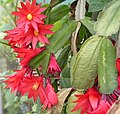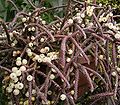The Rhipsalideae are a small tribe of cacti, comprising four or five genera (and around 60 species). They grow on trees (epiphytes) or on rocks (lithophytes)...
10 KB (872 words) - 07:21, 17 February 2023
Hatiora salicornioides (category Rhipsalideae)
species of flowering plant in the cactus family. A member of the tribe Rhipsalideae, it often grows as an epiphyte, natively in eastern Brazil and ornamentally...
13 KB (1,299 words) - 03:26, 16 July 2024
a small number belonging to a group of cacti classified as the tribe Rhipsalideae. Species of cacti belonging to this group are quite distinct in appearance...
38 KB (4,021 words) - 17:28, 8 January 2025
Rhipsalidopsis gaertneri (category Rhipsalideae)
gaertneri, is a species of epiphytic cactus which belongs to the tribe Rhipsalideae within the subfamily Cactoideae of the Cactaceae. Together with the hybrid...
9 KB (916 words) - 02:54, 14 August 2024
Korotkova, Nadja (2021-03-01). "Neotypification of Rhipsalis rhombea (Rhipsalideae, Cactaceae) and Its Taxonomic History". Haseltonia. 27 (1). Cactus and...
20 KB (849 words) - 09:49, 21 January 2025
drought. A small number of cactus species in the tribes Hylocereeae and Rhipsalideae have become adapted to life as climbers or epiphytes, often in tropical...
108 KB (12,426 words) - 04:24, 29 October 2024
American specimens are diploid. The genera currently assigned to the tribe Rhipsalideae (which include Hatiora, Lepismium, and Schlumbergera in addition to Rhipsalis)...
8 KB (391 words) - 16:54, 15 January 2025
Taxonomy of the Cactaceae (section Tribe Rhipsalideae)
genus, Calymmanthium. Of the remaining eight, only two (Cacteae and Rhipsalideae) have been shown to be monophyletic. A summary of the cladograms for...
51 KB (2,642 words) - 14:27, 31 December 2024
and nectar concentration in epiphytic cacti of tribes Hylocereeae and Rhipsalideae (Cactaceae)". Perspectives in Plant Ecology, Evolution and Systematics...
11 KB (1,324 words) - 05:15, 16 December 2024
Hatiora cylindrica (category Rhipsalideae)
Hatiora cylindrica is a species of often epiphytic cactus in the tribe Rhipsalideae within the subfamily Cactoideae. It is native to east Brazil, where it...
5 KB (489 words) - 17:40, 12 August 2023
Rhipsalidopsis (category Rhipsalideae)
Cactaceae, native to southern Brazil. Like other members of the tribe Rhipsalideae, its species are epiphytes, growing on trees. The genus Rhipsalidopsis...
5 KB (387 words) - 02:05, 29 July 2024
Hatiora (category Rhipsalideae)
Hatiora is a small genus of epiphytic cacti which belongs to the tribe Rhipsalideae within the subfamily Cactoideae of the Cactaceae. Recent taxonomic studies...
11 KB (1,004 words) - 04:03, 30 July 2024
in 1983. The generic boundaries within the tribe to which it belongs, Rhipsalideae, have long been unclear. On the basis of a molecular phylogenetic study...
4 KB (306 words) - 07:31, 17 February 2023
Hatiora herminiae (category Rhipsalideae)
Hatiora herminiae is a species of flowering plant in the tribe Rhipsalideae, family Cactaceae. It grows as an epiphyte in cloud forests in Southeast Brazil...
5 KB (447 words) - 04:57, 13 August 2023
Notocacteae Copiapoa – Eriosyce – Neowerdermannia – Parodia – Yavia Rhipsalideae Hatiora – Lepismium – Rhipsalis – Rhipsalidopsis – Schlumbergera Goettsch...
8 KB (516 words) - 09:36, 30 December 2024
Order: Caryophyllales Family: Cactaceae Subfamily: Cactoideae Tribe: Rhipsalideae Genus: Lepismium Pfeiff. Synonyms Acanthorhipsalis (K.Schum.) Britton...
2 KB (78 words) - 06:09, 17 February 2023
Rhipsalidopsis rosea (category Rhipsalideae)
Félix & Lohmann, Lúcia G. (2011-03-01), "Molecular phylogeny of tribe Rhipsalideae (Cactaceae) and taxonomic implications for Schlumbergera and Hatiora"...
2 KB (143 words) - 07:21, 17 February 2023
his doctorate in 1873 at the University of Göttingen with a thesis on Rhipsalideae. From 1874 he worked as a lecturer at the University of Bonn, distinguishing...
3 KB (272 words) - 01:18, 2 December 2024
identify species with molecular markers? An example from the epiphytic Rhipsalideae (Cactaceae)", American Journal of Botany, 98 (9): 1549–1572, doi:10.3732/ajb...
6 KB (650 words) - 06:49, 24 May 2024















